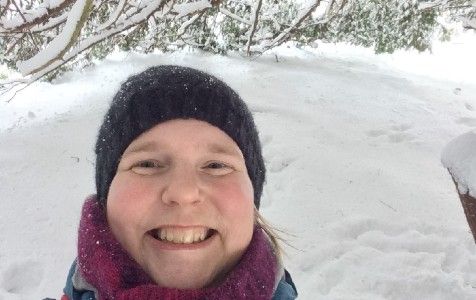Sue Krause
Published: 20 August 2021
I'm Dr. Sue Krause and a LTR (long term researcher) in the Institute. I'm not one of those scientists who knew that was what they wanted to do. I sort of fell into a career in research (started out studying to be an engineer).
 Job group: Research Associate
Job group: Research Associate
Work: full-time
Caring responsibilities: use to, youngest is almost 18 (where has the time gone?!)
Theme: Research culture, work-life balance
I'm Dr. Sue Krause and a LTR (long term researcher) in the Institute. I'm not one of those scientists who knew that was what they wanted to do. I sort of fell into a career in research (started out studying to be an engineer).
I fell into it when I was an undergraduate at the University of Wisconsin-Milwaukee, I took a biochemistry course, hoping to expand beyond the “chemistry” I learned in all the biology courses. I was a bit cheeky (& totally uncharacteristic of me) and asked my biochemistry Professor if we were going to study anything other than glycolysis/citric acid cycle. Either I impressed him with my boldness or glycolysis knowledge because Prof. Stephen Ragsdale offered me a job in his lab at the end of our discussion. I was surprised how much I enjoyed working in a lab because I disliked most of the lab practical classes I had as an undergraduate. Doing research (even if it was as simple as getting a protocol to work efficiently in a lab) was more fun than the practical lab classes.
I enjoyed it so much that I decided to pursue a career in research. I was accepted by the Biology Department at Johns Hopkins University (I later joined the Cell Biology & Anatomy Department in the School of Medicine). My PhD was on mitotic chromosome formation in Drosophila. During my PhD studies, I moved with my advisor (Prof. Margarete Heck) to University of Edinburgh.
When I moved Edinburgh University in 1996, I noticed how balance the work/life aspect of research was – even for PhD students. No long hours, no weekends were the norm then. This was so different than how most did science in the US at the time. It was during this time I realized how important it was to have a life outside of science (even if it is still with other scientists!).
When I moved to Scotland, I didn’t plan on it being a permanent move. I had all the intentions of moving back to the US. However, my friends from Baltimore were right – I met someone special and did not go back. I have nearly spent most of my life here now.
1999 was a big year for me – my doctorate was completed. I married a non-scientist. I started my post-doctoral research with Prof. Joseph Gray in the Molecular Genetics Division at University of Glasgow. With Joe, we investigated the role of PKC in budding yeast (and dipped our toes in the early days of TOR research). A year later, my daughter, Lynne, was born. Joe was very supportive of me as a new parent (he was one, too). In 2003, my son, Ian, was born. The maternity leave/job was a close call – as we were waiting for a grant to officially come through before I could to start my leave (it just did. Phew!).
While we all are feeling the impact the COVID pandemic is having right now, Hurricane Katrina resulted in a huge impact on my research career. Joe & I were part of collaborative grant application to the NIH to study quiescence – it finally reached the score of being funded the year of Katrina. The NIH, rightly, decided to divert their resources to aid those scientists directly affected by the hurricane and thus, the grant wasn’t funded.
Unfortunately, my marriage didn’t last and in 2006, I became a single parent. Being a researcher and a single parent has had its own struggles and concerns – and trying to find the right balance between work and children.
In 2013, I started working with Prof. Julian Dow in the Institute. With Julian, I am enjoying the opportunity to do new things and thousands of Drosophila microdissections! In 2018, my family expanded to include a black mini labradoodle, named Belle.
I am currently on the university-wide postdoc forum as well as the institute’s “early” career researcher committee. I enjoy these two committees as it gives insights into direction the university & institute has in mind for its research staff.
Nowadays, outside of work, you will find me curled up with a book with a doggie at my feet – if I am not enjoying the Scottish weather with our Belle. And of course, I enjoy the company of my amazing young adult children.
Career highlights: identified the genes for two different D. melanogaster mutants, named two S. cerevisiae genes (ACK1 and RGL1), FlyAtlas2, FlyMet, and my latest is a single-cell sequencing project examining the insect kidney during develop (in fruit flies) and across insect species.
First published: 20 August 2021
<< Spotlight

